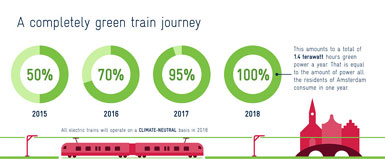While the Dutch government recently lost in court for not moving on climate emissions fast enough (and is appealing), the country is leading in one exciting way: its entire train network will run on 100% wind by 2018.
About half its energy will come from wind this year and by 2018, the 1.2 million daily passengers will travel on a system that consumes 100 gigawatt-hours of wind each year.
The contract involves Eneco, which will supply the power, and joint buying group VIVENS, which consists of Netherlands Railways, rail freight companies, Veolia, Arriva and Connexxion.
"What makes this contract and partnership unique is that a whole sector decreases its CO2 footprint enormously and sets an example for other sectors to follow. Mobility is responsible for 20% of CO2 emissions in the Netherlands, and if we want to keep travelling, it is important that we do this without burdening the environment with CO2 and particulate matter. This contract offers all Dutch citizens the option to make a climate neutral trip, regardless of distance," Michel Kerkhof of Eneco, told Railway-Technology.com.

Half the energy will come from Dutch wind farms developed by Eneco and the other half from wind farms in Scandinavia and Belgium. The idea is to increase renewable energy both in the Netherlands and in Europe by encouraging new wind farms.
Ticket prices are not expected to rise because the rail company continuously improves energy efficiency – reducing it 30% over the past decade by using new trains and more efficient driving techniques. And the 10-year wind electricity contract is under "attractive commercial conditions."
Recently, the Netherlands approved a major offshore wind project, the 600 megawatt (MW) Gemini project, expected to come online in 2017. It will add to the 2.7 gigawatts (GW) of wind capacity, mostly onshore. The country’s goal is for 4.45 GW of wind by 2023.
India Turns to Solar
In India, SunEdison just finished installing 1.9 MW of solar systems on eight of
India is also home to the first airport that runs solely on solar. Cochin International, its fourth largest airport in terms of passenger traffic, will consume most of the 12 MW of solar, with a few MW leftover to send to the grid. More airports are following suit, such as Netaji Subash Chandra Bose International Airport, which is planning a 15 MW system.
Mexico Too
A $9.2 billion international airport is under construction in Mexico City, one of the biggest in the world and "most sustainable," say the developers. 120 million people are expected to pass through the 6 million-square-foot structure each year. The entire structure will be covered in solar and will collect rain water.
In the US, Phoenix Airport has 5.4 MW of solar and Denver International has 8 MW.
Read our article, Airports Launch Carbon Certification System.
